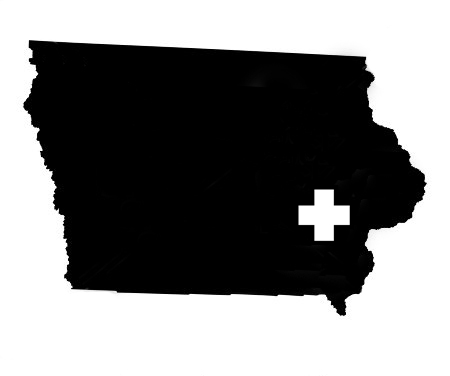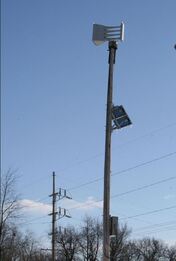
Outdoor weather sirens in Johnson County are tested regularly, at 10 am on the first Wednesday of every month. If the test needs to be rescheduled for some reason, it will occur on the 2nd Wednesday of the month at the same time. If you hear the siren, first check to see if it is just the test day. If you hear the siren at another time, you need to take action to avoid being caught in a severe weather event. This means getting to a safe place indoors as quickly as possible and following local media for weather updates. Johnson County’s sirens will go off during tornado warnings, severe thunderstorm warnings, when winds are greater than 70 MPH and if hail is expected to be golf ball sized or larger.
These sirens are part of a comprehensive warning system designed to alert people working outside of impending severe weather conditions. Often they cannot be heard inside, so it is important to not rely solely on sirens as your personal warning system. Always check local television and radio stations for specific weather information.
Tornado Watch: Be Prepared - tornado watches are issued by the Storm Prediction Center for a county experiencing weather conditions which could result in tornadoes. A watch area is usually large, which is why you should begin following weather alerts from local sources once a tornado watch has been issued. When a tornado watch has been issued in your area, you should check to make sure your safe space is prepared so that if a warning is issued, you can act quickly.
Tornado Warning: Take Action - tornado warnings are issued if a tornado has been spotted or indicated by radar. Warnings are issued by local forecast offices, and are usually much smaller in area compared with a tornado watch. If there is a tornado warning, you need to take shelter immediately.
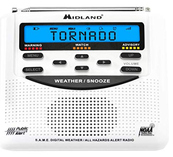
If you’re in an area with a tornado warning, you must take shelter immediately. Sign up for notifications from Johnson County Emergency Notifications to ensure you will receive notification during emergency events:
Sign up for notifications here
I have found that most weather apps can be confusing to use when trying to determine if you are in a tornado warning area. Local television and radio stations are always the best resources to help you determine current local weather conditions. If you do not have local television channels, I recommend bookmarking a local television station’s website with live feed so you have access to their information. I use this site:
CBS 2 Iowa
It’s also great to have a radio on hand, tuned to a local radio station like 600 AM. If you want to be even more prepared, you can buy a NOAA weather radio which will broadcast information about the weather from a nearby National Weather Service office. An example of one of these radios can be found here:
Weather Radio on Amazon
Finally, when in doubt, it is always better to seek shelter in your designated safe space. Stay in your safe space until you receive notification through local sources that you are no longer in the warning area.
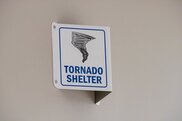
Ideally, you will go in the basement of your house in a windowless room to wait out the tornado warning. This room, if possible, should be stocked with some essential items, which we will cover in the next section. If, however, you live somewhere that has a basement but does not have a windowless room you should try to stay away from the windows or possibly cover them up while you are in there. If you do not have a basement or live in an apartment building you should take shelter in an interior room without windows on the lowest floor of a sturdy building, whatever that means for your situation. If you look into where this should be ahead of time then you will know where to go when the next tornado warning happens.
If you are not at home, either get home if it is close by, go to a friend's home that is close to your location, or go somewhere that is close to you that has a storm shelter, like the hospital or mall. It is very important that if you are driving when a warning is issued that you do not stay in your car. Cars are not safe shelters from tornadoes.
We have a comprehensive list of what to do by location if you are interested in reading further:
What to Do in a Tornado
It’s easy to feel alarmed when you’re reading this, but bear in mind that in almost every case, you’ll be alerted to a tornado warning well in advance. Preparation is key and knowledge is power!
Sometimes tornado warnings only last 30-45 minutes, but sometimes they last much longer - here in Iowa some storm systems generate multiple funnel clouds at different intervals. Identifying what to have in your shelter is a bit of a cost/benefit analysis; you don’t want to go crazy trying to remember every possible item you need, but you want to keep yourself and your family safe in case the worst occurs. These are the recommendations we can offer for how to be prepared in your safe place:
- Bring your pets into your shelter; leash them, if necessary, or bring their leashes with you.
- Bring or wear sturdy shoes. If you end up having to go through any amount of debris in the aftermath these will protect you.
- Have a list of things to grab that either you don't want to store long-term or cannot store long-term in your safe place. Have this list available to grab easily so you don't forget to bring anything with you into your safe space.
- Store these items in your safe space: one change of clothes per person (including underwear), diapers and wipes if applicable, canned food and a can opener, granola bars, crackers and peanut butter, plastic utensils, napkins, plates, paper towels, toilet paper, flashlight and extra batteries, pocket knife, hand sanitizer, whistle, garbage sack, pads/tampons, chapstick, hairbrush and ties, ponchos, travel size toiletries, first aid kit, and lots of bottled water. Please note that this list might need to be changed according to your family's needs. For example, if you have a dog you will also need dog food and a pee pad.
- In addition, I like to grab food, toys, electronics, chargers, and extra blankets and pillows so sitting on the floor doesn’t get too uncomfortable or boring. I grab a laundry basket or toy bin and pile those things in it, then head to the basement with them.
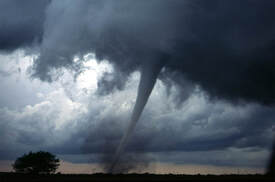
We hope this article has helped you, and that moving forward you will feel confident you are doing what is needed in order to be safe during tornado season.
If anyone has extra tips, please leave us a comment! We’d love to hear them!
Welcome to Iowa!

 RSS Feed
RSS Feed
